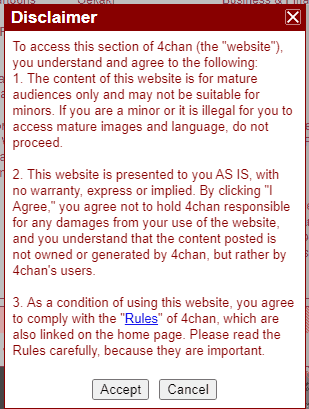What is 4chan and why is it controversial?
Launched in 2003, 4chan is an established imageboard website with 20 million visitors monthly and 900,000 new posts per day. But its anonymity and over-18 age limit means that it is unsafe for teens to use 4chan, 8chan and their counterparts.

In this guide
What is 4chan?
4chan is a website with a userbase made up mostly of young males. Official demographics state that the most popular age group are those between 18 and 25. However, there are personal stories online of teens who use 4chan.
The developers originally created the website as an answer to Japan’s 2chan and used it to discuss anime. However, it now has image and message boards ranging from video gaming to adult content. These are easily accessible by all visitors to the site.
4chan is also a source for many internet memes as well as political movements, hacktivism and cyber attacks. As a result, it has been at the centre of many controversies in the media and may impact your teen’s online safety.
How does 4chan work?
Those who use 4chan do not need to sign up. Users can share all images and discussions anonymously. When a user lands on the page, they can choose any of the boards.
When trying to access a board, a message will pop up that says content is for “mature” users only. This is 4chan’s disclaimer of harm on the boards and request for users to read the rules.

The site rules state that 4chan is only for 18+, but the use of ‘mature’ could mislead some users. For example, a teen landing on the site may consider themselves mature enough to view the content regardless of whether they are a minor.
Users can then ‘Start a New Thread’ with an image and choose to remain anonymous or type in a name. When posted, other users can then reply directly to the original post anonymously as well. The site tracks users’ IP addresses and can ban them if they break site rules. Users can appeal these bans.
Is 4chan safe for teens to use?
4chan is for users age 18 and over due to the inappropriate content. This content is easily accessible on the site and can endanger children’s online safety.
Although the site has rules in place for each board, the most popular board, /b/ or ‘random’, has fewer rules. In fact, it allows hate speech such as racism and transphobia along with specific pornographic and grotesque content. The site rules prohibit such content from appearing outside of /b/.
They mark some boards as “worksafe,” meaning that inappropriate content is against the rules.
4chan does not have any types of parental controls or privacy settings. Users can choose to be anonymous and can access any boards they choose. However, you can set parental controls on broadband and mobile networks that can limit teens’ access to 4chan.
Other sites such as 8kun (formerly 8chan) and 16chan also exist. On 8chan, content is less moderated than 4chan and therefore even less safe for teens. 16chan exists anonymously on the dark web and contains content that is illegal and unmoderated.
Why is 4chan controversial?
The content found on the imageboard has placed 4chan at the centre of many controversies. Notable ones include Gamergate, various cyber attacks, threats of violence in America and child pornography.
There are understandably concerns around the community’s promotion of misogyny and violence across the site. Some see these controversies from years ago as major contributors to incel culture and the spread of hate online.
Despite these dangers to their online safety, teens may still use the site. They might find offensive or ‘edgy’ memes funny. Our research saw that several teens and dads found humour in Andrew Tate’s “crude statements about women,” for example.
Additionally, 4chan’s creator, Christopher Poole, was a teen when he created the imageboard. If he found something like this interesting as a teen, it’s likely other teens will as well.
What is 8kun?
Just like 4chan is an English counterpart to Japan’s 2chan, others have created other iterations of 4chan. Some of them contain more harmful content, so it’s important to be aware of these as well.
8chan was created in response to some who believed 4chan had become too heavily moderated. Unlike 4chan, 8chan (now 8kun) doesn’t appear in Google search results.
With fewer restrictions about what users post, violent and illegal material stays on the website. This led to 8chan becoming a source of criminal activity. As a result, the former 8chan was shut down in 2019 and replaced by 8kun with the same goal of little moderation.
8kun lets users create their own boards on any topic. As such, many groups on 8kun are considered to be the source for conspiracies, violent crimes and hate groups.
What to do if your teen uses 4chan
A lot of young people may find themselves using 18+ sites despite the threat to their online safety because of curiosity or peer pressure. They may believe that they are more mature than others their age, which could leave them open for risk. Here are some things you can do to keep your teen safe:
Have conversations about age restrictions and why they exist. Websites with 18+ restrictions are there to keep children safe. They contain content that might be traumatising or present unrealistic standards about life and relationships. In the case of 4chan and 8kun, these sites may also contain communities that target vulnerable young people to join them. These communities could spread hate and misinformation.
Talk about what they are doing online. Conversations about what they do in general can help you be a closer part of their online world. This may also help them feel more comfortable about sharing when they come across something concerning online.
Devices and online applications generally have parental controls that limit what kind of websites your child can visit. You can also set these parental controls through broadband and mobile networks to ensure family-wide security.
Complete regular health checks on their devices: make sure your child hasn’t downloaded any extra software, like VPNs or untrustworthy apps, that could bypass parental controls